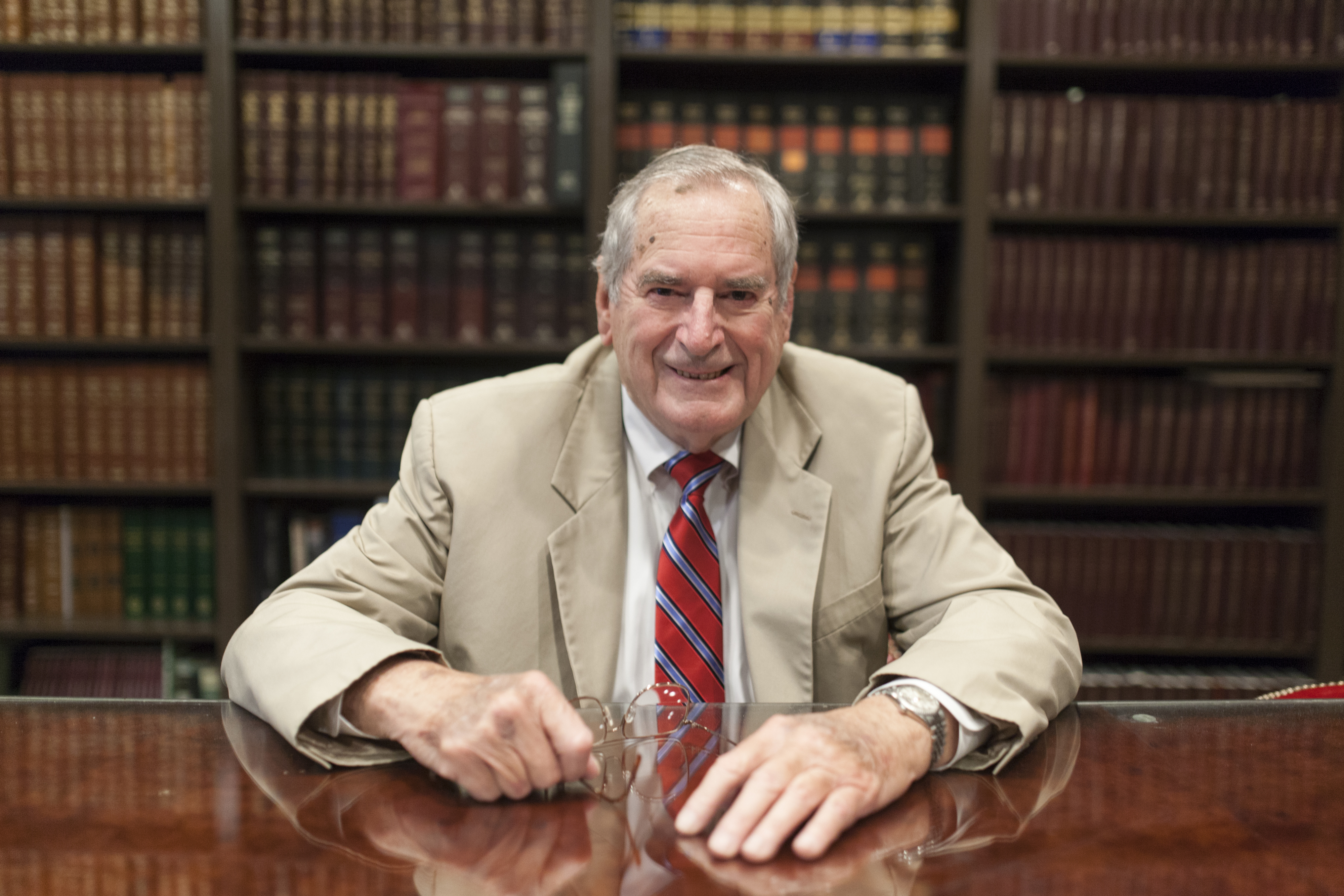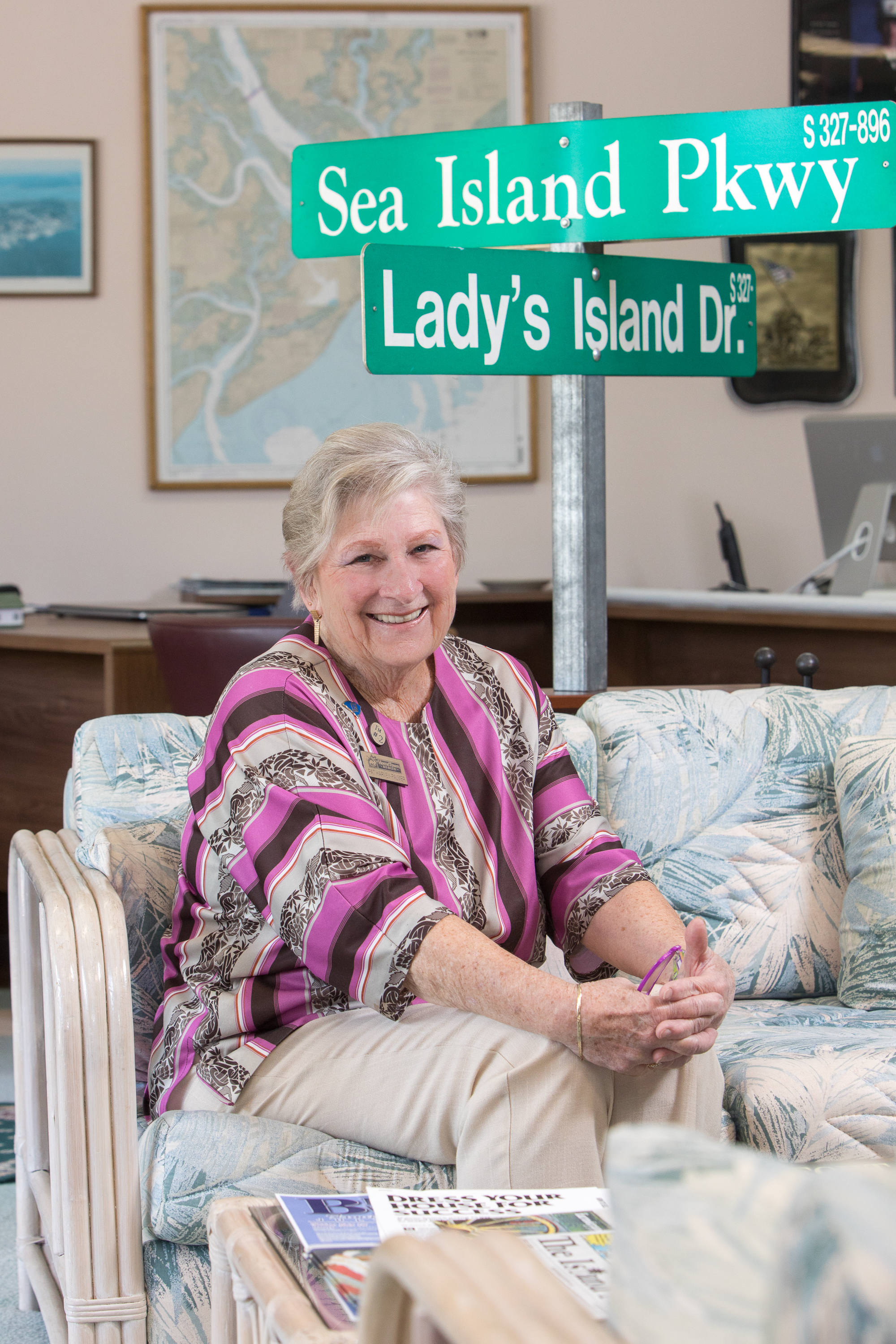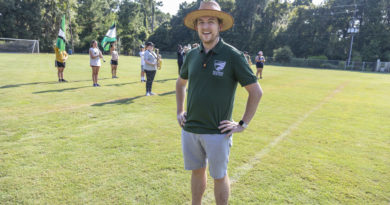Once a Water Festival Commodore, Always a Water Festival Commodore : Colden Battey, Jr.
story by Lindsey Lenoir
photos by John Wollwerth
photos by John Wollwerth
Over 50 years ago, during the summer of 1966 the sounds of the Beatles, Petula Clark, Simon and Garfunkel and the Monkees were heard over the airwaves. The United States had just officially placed the first combat troops on the shores of Vietnam the year before, and we were still in the “space race” with the Soviet Union in putting a man on the moon.
In the sleepy little coastal town of Beaufort, SC, the waterfront was teaming with festival goers, there to experience the city’s 11th annual Water Festival. Leading the charge that year was Beaufort’s very own Colden Battey, Jr. As many before and after him, the honor of being chosen to be the festival’s Commodore was bestowed upon him because of his many contributions to the town of Beaufort.
Battey recalls, “The Water Festival at that point was not nearly on the scale of what it is today.” He paints a picture, “First of all, most of the events were held at the bandshell, or on the water. Where the parking lot for the marina is now, there was a bandshell up on the hill there and all of that space there was vacant and people would bring in chairs…the venue was right there…that’s where the beauty pageant and even the dance were held.” Unlike the unobstructed view that we now enjoy of the waterfront, there were only a few places that one could set up and see the water shows.
Today, over the span of 10 days, the Water Festival offers a lineup of concerts in the park, shrimp boat tours, fireworks, air show, an arts and crafts market, and yes, even a Bed Race. These, along with many more activities allow festival-goers to have the full “Beaufort” experience.
However, in 1966, when Colden Battey, Jr. was Commodore, the festival only lasted four days. “We still have many of the same activities we did back then, but a few have gone by the wayside, and a few have been added.” Colden reminisces, “Even at that time we kicked off with the golf tournament. The festival then was Friday through Sunday and most of the events were free. The golf tournament was a big deal because most of the people involved were big golfers.” On Friday night, the bandshell stage hosted the beauty pageant, “A lot was centered around the beauty pageant.” The Water Festival date was actually set to fall on the weekend before the Miss South Carolina pageant. There were normally between 30 and 50 girls that would participate and they did so to get themselves ready for Miss SC. Saturday was the parade. “The parade was a big deal at the time. All of the pageant queens were in it. We had a heck of a time finding convertibles for all of them them!” Along with the pageant queens were around 6 to 8 elaborately decorated floats.
“One year we had the Army, Navy, and Marine Corps bands.” Battey ponders, “We also had a good many politicians that would come. We even had James F. “Jimmy” Byrnes who had been Secretary of State, United States Senator, Supreme Court Justice, and eventually the Governor of South Carolina. He always came to the parade.” There would be a luncheon after the parade in which all of the politicians were invited. “It was a big deal and we usually had about 90 people there. It used to be held at the National Guard Armory, but was later held at the St. Helena Parrish House.” The rest of the day consisted of air shows, skydivers, and stunt planes. “When we first started doing the festival, we even had the Blue Angels come and fly over the bridge.” One year, it was a very windy day. “As some of the parachuters were coming down during the air show, the wind kicked up and we ended up with one guy on the roof of the police station and another in the St. Helena church yard.”
Accompanying the air show was always a ski show. “We began to have the Silver Springs Professional Skiers perform along with the local ski club.” Saturday night, the beauty pageant would feature evening gowns and the announcement of the winner, followed by the dance. “The year that I was Commodore there wasn’t much for the young people to do, the dance was more for the adults. One thing I did was to put in a dance at the armory. Later it became the street dance.”
On Sunday, there was a repeat of the air show and then the blessing of the fleet. “There would be a dozen or so shrimp boats all decorated, then we would have the speed boat races. Those speedboats sure made a helluva lot of noise, but I miss them!”
In 1966, Beaufort was on the cusp of undergoing many changes. Modern neighborhoods, golf courses, and commercial buildings were springing up everywhere, all while taking great strides to still preserve the natural landscape and beauty of the sea islands. “Beaufort was just so much smaller then. It was mainly just the local community in those days.” Back in the 40’s and early 50’s, sailboat racing was popular in Beaufort. Colden recalls, “ By the mid 50’s it had sort of died out, and everybody knows how hot it is here in the summer. We all thought, ‘Now what are we going to do?’ That’s basically how it all got started.” Festival organizers wanted to make sure that most of the events were free. “We tried to get everybody there. We wanted the whole community to come out and have a good time and not worry about the cost.”
It clearly takes a lot of time and dedication to put on an event of this magnitude. “It’s really a big job being the Commodore. If things don’t go well, it falls on you. Back then it was pretty much a one-man job. I had a secretary, and maybe one or two fellows that would help out, and of course the Rotary Club and Lion’s Club. We didn’t have the cavalry of people that it takes now. The Commodore is generally responsible for pretty much everything, getting sponsors, and of course making sure everyone is working together.” There are program directors, which are often times Commodore-elects, and many other different directors who handle the logistics of the air show, water show, band etc. “It makes a big difference when everyone works together.”
Colden Battey, Jr. currently serves on the Water Festival’s Board of Directors. All past Commodores are automatically on the Board and meet a couple of times over the year. The responsibility of selecting a new Commodore each year resides with them. He still practices law in the heart of downtown Beaufort. He was chairman of the County Council for 8 years and is now the chairman of the Nemours Wildlife Foundation. The foundation maintains 10,000 acres, that houses a rich diversity of natural habitats. It offers an educational outreach program for people who are looking to receive a Master’s or PhD in Wildlife Biology and Conservation. Among his many commitments, he is also on the Jasper Port Authority and serves on the Board of Trustees for the Beaufort County Open Land Trust.
Although born in Augusta, Colden’s family is from Beaufort and they moved back here when he was in high school. “I went to the college, was in the Navy for four years, and then went to law school. I got the opportunity to travel around when I was first out of law school. I decided, ‘Why would I want to live anywhere else?’ I’ve got family, can make a good living, hunt, fish, do whatever I want. I’ve been back here now for over 55 years.”
When asked what he would like to see return to the Water Festival he replied, “I miss the parade, like it used to be…a lot of decorated floats, and bands…it was such a big deal. I miss the speed boats too. I miss having the politicians being a big part of it. I’d also like to see more free things for the public, so everyone would have the ability to participate.”
The former Commodore has seen many changes over the years. He laments, “It’s amazing that the festival has gone on for 63 years continuously. The public support is phenomenal. We have so many dedicated volunteers: people that have been doing this for 10 or 15 years. They often use their vacation time from work to come work the festival. It’s really amazing to me that a festival of this scale has lasted all of these years. It is definitely a testament to the dedication of the volunteers and residents of Beaufort.”
In the sleepy little coastal town of Beaufort, SC, the waterfront was teaming with festival goers, there to experience the city’s 11th annual Water Festival. Leading the charge that year was Beaufort’s very own Colden Battey, Jr. As many before and after him, the honor of being chosen to be the festival’s Commodore was bestowed upon him because of his many contributions to the town of Beaufort.
Battey recalls, “The Water Festival at that point was not nearly on the scale of what it is today.” He paints a picture, “First of all, most of the events were held at the bandshell, or on the water. Where the parking lot for the marina is now, there was a bandshell up on the hill there and all of that space there was vacant and people would bring in chairs…the venue was right there…that’s where the beauty pageant and even the dance were held.” Unlike the unobstructed view that we now enjoy of the waterfront, there were only a few places that one could set up and see the water shows.
Today, over the span of 10 days, the Water Festival offers a lineup of concerts in the park, shrimp boat tours, fireworks, air show, an arts and crafts market, and yes, even a Bed Race. These, along with many more activities allow festival-goers to have the full “Beaufort” experience.
However, in 1966, when Colden Battey, Jr. was Commodore, the festival only lasted four days. “We still have many of the same activities we did back then, but a few have gone by the wayside, and a few have been added.” Colden reminisces, “Even at that time we kicked off with the golf tournament. The festival then was Friday through Sunday and most of the events were free. The golf tournament was a big deal because most of the people involved were big golfers.” On Friday night, the bandshell stage hosted the beauty pageant, “A lot was centered around the beauty pageant.” The Water Festival date was actually set to fall on the weekend before the Miss South Carolina pageant. There were normally between 30 and 50 girls that would participate and they did so to get themselves ready for Miss SC. Saturday was the parade. “The parade was a big deal at the time. All of the pageant queens were in it. We had a heck of a time finding convertibles for all of them them!” Along with the pageant queens were around 6 to 8 elaborately decorated floats.
“One year we had the Army, Navy, and Marine Corps bands.” Battey ponders, “We also had a good many politicians that would come. We even had James F. “Jimmy” Byrnes who had been Secretary of State, United States Senator, Supreme Court Justice, and eventually the Governor of South Carolina. He always came to the parade.” There would be a luncheon after the parade in which all of the politicians were invited. “It was a big deal and we usually had about 90 people there. It used to be held at the National Guard Armory, but was later held at the St. Helena Parrish House.” The rest of the day consisted of air shows, skydivers, and stunt planes. “When we first started doing the festival, we even had the Blue Angels come and fly over the bridge.” One year, it was a very windy day. “As some of the parachuters were coming down during the air show, the wind kicked up and we ended up with one guy on the roof of the police station and another in the St. Helena church yard.”
Accompanying the air show was always a ski show. “We began to have the Silver Springs Professional Skiers perform along with the local ski club.” Saturday night, the beauty pageant would feature evening gowns and the announcement of the winner, followed by the dance. “The year that I was Commodore there wasn’t much for the young people to do, the dance was more for the adults. One thing I did was to put in a dance at the armory. Later it became the street dance.”
On Sunday, there was a repeat of the air show and then the blessing of the fleet. “There would be a dozen or so shrimp boats all decorated, then we would have the speed boat races. Those speedboats sure made a helluva lot of noise, but I miss them!”
In 1966, Beaufort was on the cusp of undergoing many changes. Modern neighborhoods, golf courses, and commercial buildings were springing up everywhere, all while taking great strides to still preserve the natural landscape and beauty of the sea islands. “Beaufort was just so much smaller then. It was mainly just the local community in those days.” Back in the 40’s and early 50’s, sailboat racing was popular in Beaufort. Colden recalls, “ By the mid 50’s it had sort of died out, and everybody knows how hot it is here in the summer. We all thought, ‘Now what are we going to do?’ That’s basically how it all got started.” Festival organizers wanted to make sure that most of the events were free. “We tried to get everybody there. We wanted the whole community to come out and have a good time and not worry about the cost.”
It clearly takes a lot of time and dedication to put on an event of this magnitude. “It’s really a big job being the Commodore. If things don’t go well, it falls on you. Back then it was pretty much a one-man job. I had a secretary, and maybe one or two fellows that would help out, and of course the Rotary Club and Lion’s Club. We didn’t have the cavalry of people that it takes now. The Commodore is generally responsible for pretty much everything, getting sponsors, and of course making sure everyone is working together.” There are program directors, which are often times Commodore-elects, and many other different directors who handle the logistics of the air show, water show, band etc. “It makes a big difference when everyone works together.”
Colden Battey, Jr. currently serves on the Water Festival’s Board of Directors. All past Commodores are automatically on the Board and meet a couple of times over the year. The responsibility of selecting a new Commodore each year resides with them. He still practices law in the heart of downtown Beaufort. He was chairman of the County Council for 8 years and is now the chairman of the Nemours Wildlife Foundation. The foundation maintains 10,000 acres, that houses a rich diversity of natural habitats. It offers an educational outreach program for people who are looking to receive a Master’s or PhD in Wildlife Biology and Conservation. Among his many commitments, he is also on the Jasper Port Authority and serves on the Board of Trustees for the Beaufort County Open Land Trust.
Although born in Augusta, Colden’s family is from Beaufort and they moved back here when he was in high school. “I went to the college, was in the Navy for four years, and then went to law school. I got the opportunity to travel around when I was first out of law school. I decided, ‘Why would I want to live anywhere else?’ I’ve got family, can make a good living, hunt, fish, do whatever I want. I’ve been back here now for over 55 years.”
When asked what he would like to see return to the Water Festival he replied, “I miss the parade, like it used to be…a lot of decorated floats, and bands…it was such a big deal. I miss the speed boats too. I miss having the politicians being a big part of it. I’d also like to see more free things for the public, so everyone would have the ability to participate.”
The former Commodore has seen many changes over the years. He laments, “It’s amazing that the festival has gone on for 63 years continuously. The public support is phenomenal. We have so many dedicated volunteers: people that have been doing this for 10 or 15 years. They often use their vacation time from work to come work the festival. It’s really amazing to me that a festival of this scale has lasted all of these years. It is definitely a testament to the dedication of the volunteers and residents of Beaufort.”



